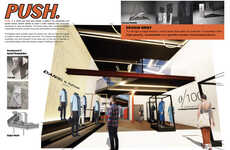
Proximity Designs is a Myanmar-Based Non-Profit Enterprise
Rebecca Byers — September 4, 2012 — Social Good
References: proximitydesigns.org & fastcoexist
Proximity Designs is a not-for-profit social enterprise based in Myanmar, Burma and the recent recipient of the 2012 Skoll Award for Social Entrepreneurship. The success behind Proximity Designs is deemed logical and simple: design products that the poor actually need.
The Burma-based design lab is a hub for the creation of well-made, affordable products that have the power to change lives. The world's working poor are a huge untapped market with a little cash to spend that they can carefully spend, which further points to the idea that companies should make things they're willing to buy.
Proximity Designs has been increasing incomes and making a meaningful impact in rural economies since 2004 through its production and distribution of useful community-targeted tools.
Contact Information
Proximity Designs website
Proximity Designs on Facebook
Proximity Designs on Twitter
The Burma-based design lab is a hub for the creation of well-made, affordable products that have the power to change lives. The world's working poor are a huge untapped market with a little cash to spend that they can carefully spend, which further points to the idea that companies should make things they're willing to buy.
Proximity Designs has been increasing incomes and making a meaningful impact in rural economies since 2004 through its production and distribution of useful community-targeted tools.
Contact Information
Proximity Designs website
Proximity Designs on Facebook
Proximity Designs on Twitter
Trend Themes
1. Poverty-focused Innovation - Creating well-made, affordable products that meet the needs of the working poor, tapping into an untapped market with potential for disruptive innovation.
2. Community-targeted Tools - Designing and distributing useful tools that have a meaningful impact in rural economies, offering opportunities for innovative solutions.
3. Social Entrepreneurship - Combining business strategies with social impact to address poverty and improve livelihoods, opening doors for disruptive innovation.
Industry Implications
1. Product Design - Designing products that are affordable, well-made, and cater to the needs of the working poor, presenting opportunities for disruptive innovation.
2. Rural Development - Working towards improving rural economies by providing community-targeted tools and solutions, creating chances for disruptive innovation.
3. Social Enterprise - Harnessing the power of business to address social issues like poverty, offering a platform for innovative solutions and disruptive innovation.
4.1
Score
Popularity
Activity
Freshness























